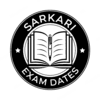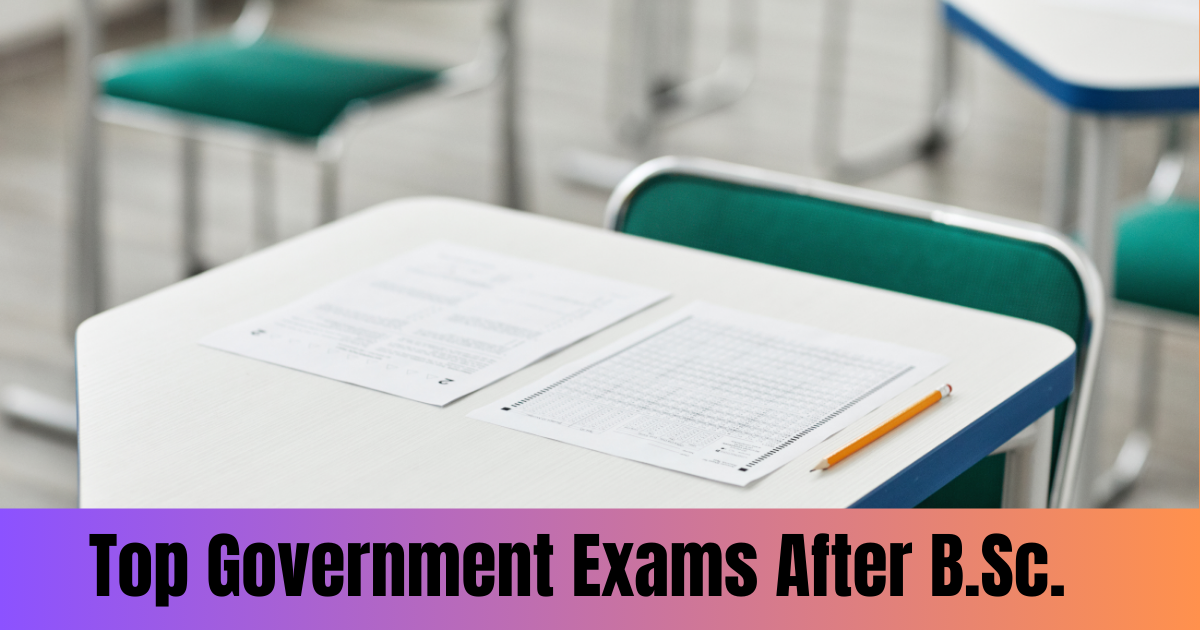Last Updated on 27 December 2024 by Piyush Kumar
Top Government Exams After B.Sc. – Completing a Bachelor of Science (B.Sc.) degree opens up numerous opportunities, especially in government sectors. For those aspiring to secure stable and prestigious careers, government exams provide an ideal platform. These exams not only offer lucrative salaries but also job security, growth prospects, and additional perks.
In this article, we will explore the most popular government exams available for B.Sc. graduates, their eligibility criteria, exam patterns, and preparation tips.
Why Choose Government Jobs After B.Sc.?
Government jobs have always been a preferred choice for individuals due to several advantages, such as:
- Job Security: Unlike private-sector jobs, government positions offer long-term stability.
- Financial Benefits: Competitive pay scales, allowances, and retirement benefits.
- Work-Life Balance: Fixed working hours and holidays allow for a balanced lifestyle.
- Career Growth: Regular promotions and professional development opportunities.
- Prestige: Working for the government adds to one’s societal status.
Top Government Exams After B.Sc.
Here is a comprehensive list of government exams that B.Sc. graduates can apply for, along with their key details.
1. UPSC Civil Services Examination (CSE)
The Union Public Service Commission (UPSC) conducts the Civil Services Examination to recruit candidates for prestigious positions such as IAS, IPS, and IFS.
- Eligibility:
- A B.Sc. degree from a recognized university.
- Age: 21-32 years (relaxation for reserved categories).
- Selection Process:
- Preliminary Exam (Objective)
- Main Exam (Descriptive)
- Personal Interview
- Subjects: General Studies, Optional Subject, Essay Writing, and Current Affairs.
- Why B.Sc. Graduates Should Apply: Scientific knowledge and logical reasoning skills can be advantageous in subjects like Geography, Physics, and Environment.
2. Staff Selection Commission (SSC) Exams
The SSC conducts various exams to recruit candidates for Group B and C posts in government ministries and departments.
a) SSC CGL (Combined Graduate Level Exam)
- Eligibility:
- A bachelor’s degree (B.Sc. qualifies).
- Age: 18-32 years, depending on the post.
- Selection Process:
- Tier 1: Computer-Based Test
- Tier 2: Computer-Based Test (Advanced)
- Tier 3: Descriptive Paper
- Tier 4: Skill Test (if applicable)
- Popular Posts for B.Sc. Graduates:
- Assistant Section Officer
- Inspector (Income Tax, Central Excise)
- Statistical Investigator
b) SSC CHSL (Combined Higher Secondary Level Exam)
While primarily aimed at 10+2 candidates, B.Sc. graduates are eligible and may have an advantage due to their advanced education.
3. Indian Railways Exams
The Railway Recruitment Board (RRB) offers multiple opportunities for B.Sc. graduates through exams such as:
a) RRB NTPC (Non-Technical Popular Categories)
- Eligibility: Bachelor’s degree (B.Sc. included).
- Age: 18-33 years.
- Posts: Station Master, Goods Guard, Traffic Apprentice.
b) RRB ALP (Assistant Loco Pilot)
While technical roles like ALP often require engineering, certain positions welcome B.Sc. Physics graduates.
c) RRB Paramedical Staff
- Eligibility: Specialized B.Sc. degrees like Nursing, Biology, or Pharmacy.
- Posts: Lab Technician, Pharmacist, Staff Nurse.
4. Banking Sector Exams
The banking sector is one of the largest recruiters for graduates, including B.Sc. holders. Major exams include:
a) IBPS PO (Institute of Banking Personnel Selection – Probationary Officer)
- Eligibility:
- A bachelor’s degree (B.Sc. qualifies).
- Age: 20-30 years.
- Selection Process:
- Preliminary Exam
- Main Exam
- Interview
- Why B.Sc. Graduates Should Apply: Numerical and reasoning skills honed during the degree help in clearing the Quantitative Aptitude and Logical Reasoning sections.
SBI Clerk 2025 Notification: Vacancies, Eligibility, Application Process, Exam Pattern & Preparation
b) SBI PO (State Bank of India – Probationary Officer)
Similar to IBPS PO, this exam is for managerial roles in SBI, with excellent career growth opportunities.
c) IBPS Clerk and SBI Clerk
Clerical positions are also open for B.Sc. graduates, offering secure and steady job profiles.
5. Defence Sector Exams
The defence sector provides exciting career options for B.Sc. graduates through exams like:
a) AFCAT (Air Force Common Admission Test)
- Eligibility:
- A B.Sc. degree in Physics/Mathematics for Flying Branch.
- Any B.Sc. degree for Ground Duty (Non-Technical).
- Age: 20-24 years for Flying Branch, 20-26 years for Ground Duty.
- Selection Process:
- Written Test
- SSB Interview
- Medical Examination
b) CDS (Combined Defence Services Exam)
- Eligibility:
- A B.Sc. degree (Physics/Mathematics for Air Force and Navy).
- Any B.Sc. degree for Army.
- Age: 19-24 years.
- Why Apply?: Offers direct entry into Indian Armed Forces as an officer.
6. State Public Service Commission (PSC) Exams
State PSC exams recruit for administrative and allied services at the state level.
Eligibility:
- A B.Sc. degree from a recognized university.
- Age: 21-40 years (varies by state).
Popular State PSCs:
- Rajasthan Public Service Commission (RPSC)
- Uttar Pradesh Public Service Commission (UPPSC)
- Tamil Nadu Public Service Commission (TNPSC)
Posts include State Tax Officer, Deputy Collector, and Assistant Commissioner.
7. Teaching Sector Exams
B.Sc. graduates interested in teaching can appear for the following exams:
a) CTET (Central Teacher Eligibility Test)
- Eligibility: B.Sc. with B.Ed.
- Levels:
- Paper I: For Classes 1-5
- Paper II: For Classes 6-8
b) State TETs (Teacher Eligibility Tests)
Every state conducts its TET exam, like UPTET, HTET, and REET.
c) KVS (Kendriya Vidyalaya Sangathan)
KVS conducts exams for teaching positions in central government schools.
8. Scientific and Research Organizations
For science enthusiasts, organizations like ISRO, DRDO, and CSIR offer exciting opportunities.
a) ISRO Scientist/Technical Assistant
- Eligibility:
- B.Sc. in Physics, Mathematics, or Chemistry.
- Age: 18-30 years.
- Selection Process: Written Test + Interview.
b) DRDO CEPTAM (Defence Research and Development Organization)
- Posts: Technician, Junior Research Fellow.
- Eligibility: Relevant B.Sc. degree (Physics/Chemistry/Biology).
c) CSIR NET (Council of Scientific and Industrial Research – National Eligibility Test)
- Purpose: For lectureship or Junior Research Fellowship (JRF).
- Eligibility: B.Sc. + Master’s degree (in progress or completed).
9. Healthcare Sector Exams
a) AIIMS and ESIC Exams
- Eligibility: Specialized B.Sc. degrees like Nursing, Microbiology, or Biotechnology.
- Posts: Lab Technician, Staff Nurse, Pharmacist.
b) UPSC CMS (Combined Medical Services)
- Open for B.Sc. Nursing graduates for administrative healthcare roles.
10. Forest and Environmental Services
B.Sc. graduates in Environmental Science, Forestry, or related fields can apply for:
a) IFS (Indian Forest Service)
- Eligibility:
- B.Sc. with at least one subject like Botany, Zoology, or Chemistry.
- Age: 21-32 years.
- Selection Process: Conducted by UPSC, similar to Civil Services.
b) State Forest Services Exams
Recruit candidates for posts like Forest Ranger and Wildlife Officer.
11. FCI (Food Corporation of India)
The FCI conducts exams for various posts, including:
- Eligibility:
- B.Sc. in Agriculture, Food Technology, or Chemistry.
- Age: 21-28 years.
- Posts: Technical Assistant, Quality Control Officer.
12. NABARD and Agriculture Exams
For those with a background in agriculture or related sciences, exams like NABARD Grade A/B offer promising careers.
Eligibility:
- B.Sc. in Agriculture, Horticulture, or Animal Husbandry.
Posts:
- Assistant Manager, Agriculture Officer.
How to Prepare for Government Exams After B.Sc.
1. Understand the Exam Pattern and Syllabus
Carefully analyze the syllabus and focus on high-weightage topics.
2. Create a Study Plan
Divide your time effectively between different subjects, focusing on weaker areas.
3. Practice Mock Tests
Mock tests and previous year papers are essential for understanding the exam pattern and improving time management.
4. Stay Updated
General awareness and current affairs play a significant role in most government exams. Follow daily news and read monthly current affairs magazines.
5. Choose the Right Resources
Invest in standard books and online courses for comprehensive preparation.
Conclusion
Government exams offer a plethora of opportunities for B.Sc. graduates across various sectors. Whether you aspire to join administrative services, teaching, banking, or scientific research, there’s an exam tailored to your qualifications and interests.
Start by identifying your goals, understand the eligibility criteria, and create a well-structured preparation strategy. With determination and consistent effort, you can achieve your dream government job.
This article is SEO-optimized with targeted keywords such as “government exams after B.Sc.”, “B.Sc. graduate opportunities”, and “top government jobs for B.Sc. students.” Let me know if you’d like further refinements!

